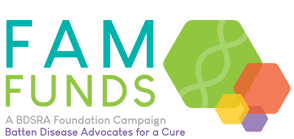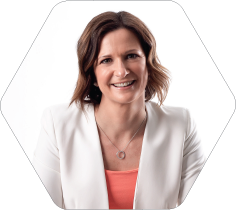Another month has passed, which means it’s time for research updates. BDSRA Foundation’s Head of Research & Medical Affairs Dr. Ineka Whiteman breaks down Batten disease clinical program updates, research news & opportunities, and resources in her monthly column, as seen in BDSRA’s monthly newsletter, The Illuminator.
FEATURED ARTICLE
Communication is connection:
Understanding speech and language in Batten disease
Over the past six months, we have featured the winning researchers and teams from the NCL Researchers Challenge at the 2023 Annual Family Conference in July. In our final installment, this month we are delighted to showcase Prof. Angela Morgan and PhD candidate Lottie Morison from the Murdoch Children’s Research Institute (MCRI) in Melbourne, Australia. Lottie’s presentation was awarded third place in the Researchers Challenge for her presentation: Communication is connection: Understanding speech, language, and non-verbal communications in Batten Disease (CLN2 & CLN3).
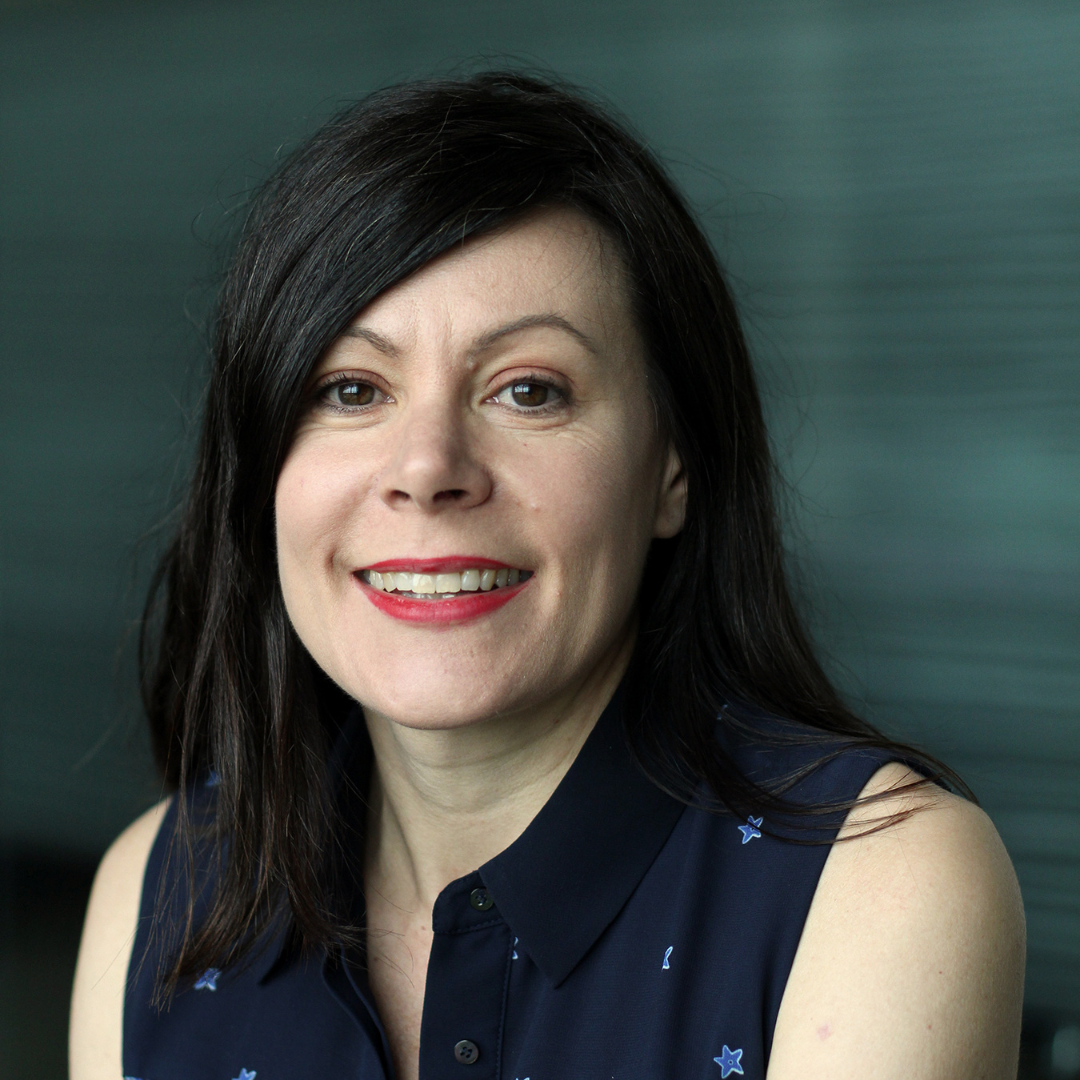
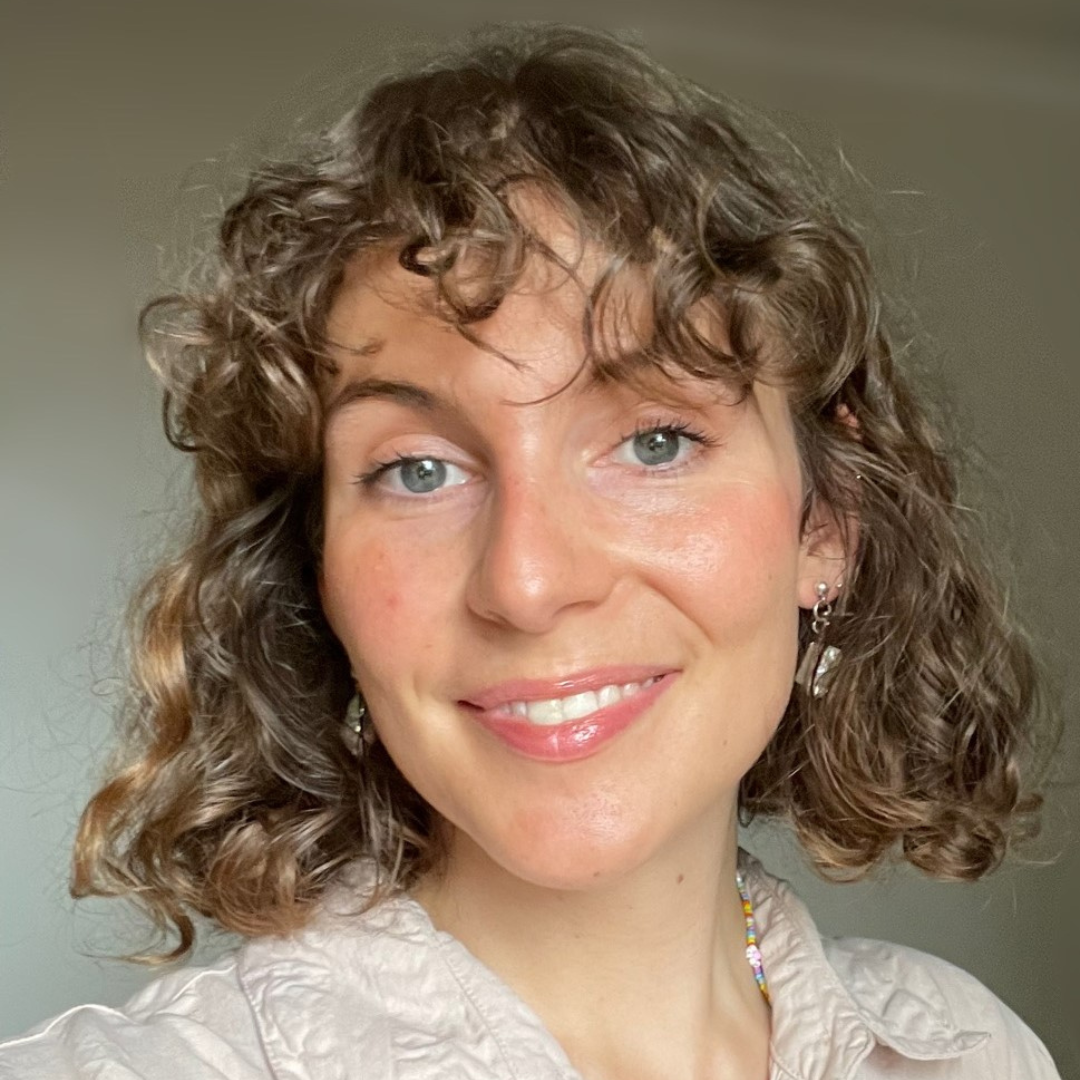
Prof. Angela Morgan (L) and Ph.D. candidate Lottie Morison
We recently interviewed Prof. Angela and Lottie to learn more about this exciting and important research.
*Note*: The research study discussed in this interview is still actively recruiting. The BDSRA Foundation would also like to take this opportunity to give families one final chance to participate in the study before it closes on March 28, 2024. The team is seeking 10 more families to enroll and complete the study (five CLN2 and five CLN3 families). The online assessment is reasonably brief (and enjoyable!), and Lottie is wonderful with our young participants!
You can read more via the link above or contact the team directly at geneticsofspeech@mcri.edu.au.
Please tell us a bit about the research carried out by your team at MCRI.
Angela: Our research team is based at the Murdoch Children’s Research Institute in Melbourne, Australia. We are an NHMRC (National Health & Medical Research) Centre of Research Excellence – the Translational Centre for Speech Disorders. Our work focuses on the genetics of speech and language disorders, including genetic conditions like Batten disease.
Lottie: I am a speech pathologist and Ph.D. candidate in Angela’s team. Currently, we are working with BDSRA Australia and the BDSRA Foundation to connect with families affected by CLN2 and CLN3 disease to characterize speech, language, and non-verbal communication.
Angela: By learning more about communication in Batten disease we hope to inform recommendations for clinical care of individuals with CLN2 and CLN3 disease, alongside identifying appropriate outcome measures for speech, language, and non-verbal communication in Batten disease. These outcomes are urgently needed so that we can determine the effects or changes in speech during clinical trials.
How did you first become interested in studying Batten disease, specifically?
Angela: One of Lottie’s other Ph.D. supervisors, Professor Ingrid Scheffer, sits on BDSRA Australia’s Medical & Scientific Advisory Board and identified a critical lack of knowledge in the healthcare sector in terms of speech and language in Batten disease, preventing optimal care. Ingrid knew my team shared a passion for understanding communication and supporting families with rare conditions and she and Ineka asked me to join the board. We then planned a study on speech and language in Batten disease and were thrilled to have Lottie take up a Ph.D. in this area.
What have been some of the most interesting findings in your research so far (Batten-specific)?
Angela: Lottie is still actively collecting and analyzing information from families to create a picture of what communication looks like in individuals with CLN2 and CLN3 disease.
Lottie: For individuals with CLN2 and CLN3 disease we are systematically characterizing the type of speech changes for the very first time. We are also learning from the children with CLN2 disease how enzyme replacement therapy has influenced their speech and language development. Lastly, families have provided us with valuable information about the communication strengths that can be used to bolster alternative communication strategies as the disease progresses.
What do you envision to be the next steps for this important research?
Angela: As we noted earlier, we really want to understand what outcome measures or tools can be used to sensitively measure change in Batten disease, for example, specific speech measures. We need these outcome measures so we can reliably measure communication responses to medications and other therapies.
Lottie: Also, we want the next steps of this research to inform the clinical practice of speech pathologists/therapists and other professionals who work with young people with Batten disease and their families.
What role do families play in your research?
Lottie: We couldn’t conduct this research without families! Families have generously given up their time to take part in this study and share their experiences of Batten disease. Families also know their children best and provide invaluable insights into the communication areas of support, areas that are changing, and areas that remain strengths for their children.
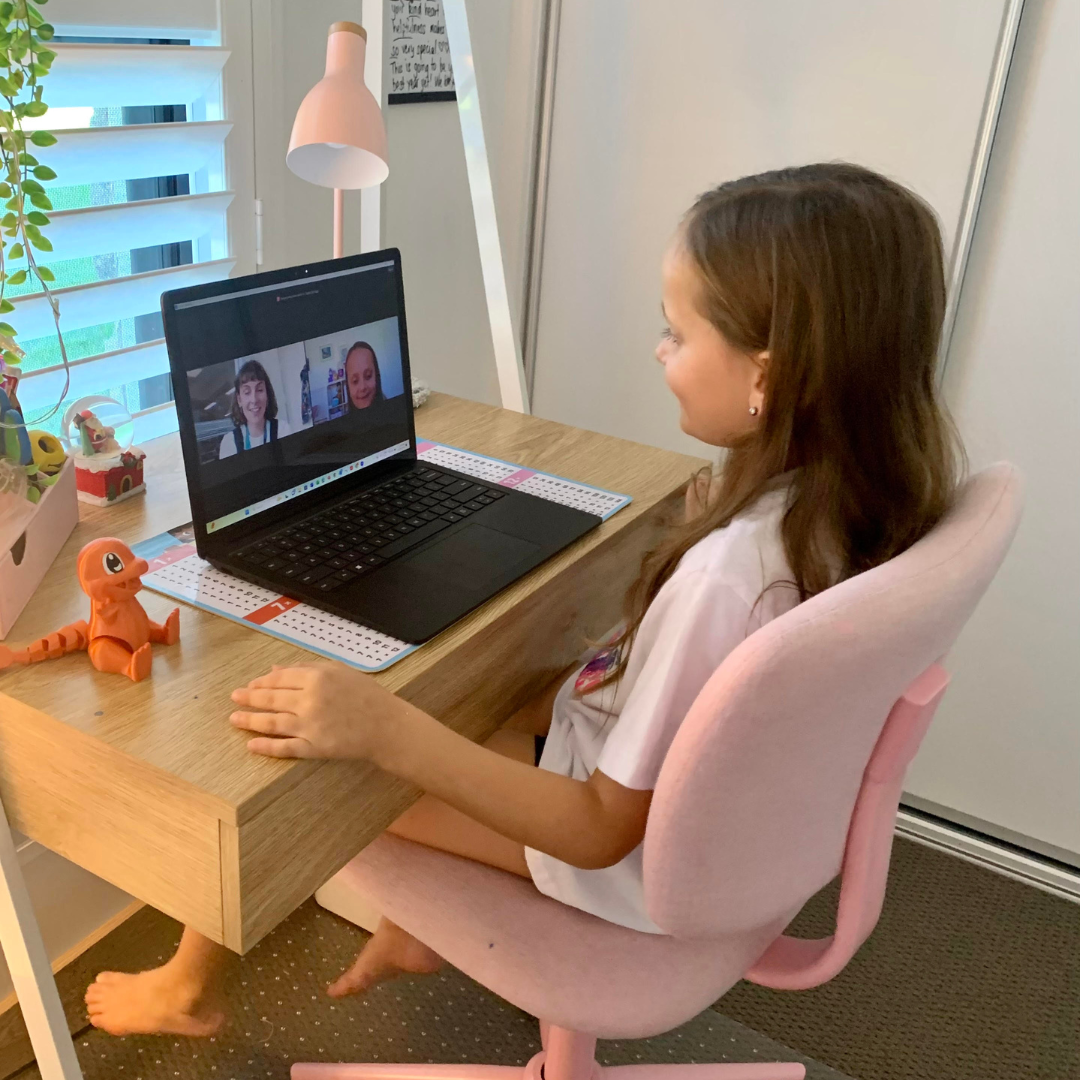
Study participants take part in speech and language assessments over Zoom with MCRI’s Lottie Morison.
Do you have any general advice for Batten families seeking further information or support with communication for their affected loved one(s)?
Lottie: As we haven’t completed the study and analyzed the data – we do not have any concrete clinical advice to give families just yet! However, it is important that families receive support to plan for the future for their children. For example, implementing alternative communication strategies as early and maintaining existing speech and language skills for as long as possible.
The importance of educating the communication partners, for example, teachers, extended family, support workers, how best to communicate with a child, and what strategies to use to support their communication is also important. Speech-language pathologists can work with families to both implement alternative communication strategies, but also to educate communication partners on how to support a child’s communication.
Study participants take part in speech and language assessments over Zoom with MCRI’s Lottie Morison.
CLINICAL PROGRAM UPDATES
Clinical Trial Tracker
Keep up to date with the latest clinical trial and natural history study news with our Clinical Studies Chart on the BDSRA Foundation’s website. Check it out by clicking here.
Amicus returns CLN3 and CLN6 clinical gene therapy programs, CLN8 preclinical, to Nationwide Children’s
As many of you know, we have been awaiting further news regarding the future of the CLN3 and CLN6 gene therapy clinical programs led by Amicus Therapeutics. On February 6, BDSRA Foundation along with its partner organizations around the world, released a joint statement to the global Batten disease community regarding the following important updates relating to both programs.
In a letter to the community, Amicus advised that it has decided to return the rights to all its Batten programs to The Abigail Wexner Research Institute at Nationwide Children’s Hospital (NCH), which includes the CLN3 and CLN6 clinical programs, and the CLN8 preclinical program. As such, NCH is now responsible for determining the next steps in developing those programs and for all follow-up with the CLN3 and CLN6 clinical trial participants and their families.
NCH has reassured our community that it remains committed to moving its CLN3 and CLN6 programs forward. Dr. Emily de los Reyes at NCH has provided further details on those plans in a separate Community Letter, which can be viewed here.
CLN1 DISEASE
Patient dosed with ‘TSH-118’ gene therapy for treatment of CLN1 disease
On February 15, important news broke regarding progress in the CLN1 gene therapy program ‘TSHA-118’, currently in Taysha Gene Therapies’ clinical development pipeline. In a statement, Taysha Gene Therapies announced that it had provided investigational clinical trial material for TSHA-118 to support the investigator-initiated trial (IIT) under an individual-patient Investigational New Drug (IND) at RUSH University Medical Center in Chicago, Illinois.
BDSRA Foundation along with its partner organizations around the world, were quick to respond, issuing a joint statement to the global Batten disease community that afternoon. A copy of the statement, including further details on the study, can be viewed here.
*Please also see our note to families below regarding Natural History Studies for CLN1 disease.
JCR Pharmaceuticals – CLN1 Enzyme Replacement Therapy Program Update
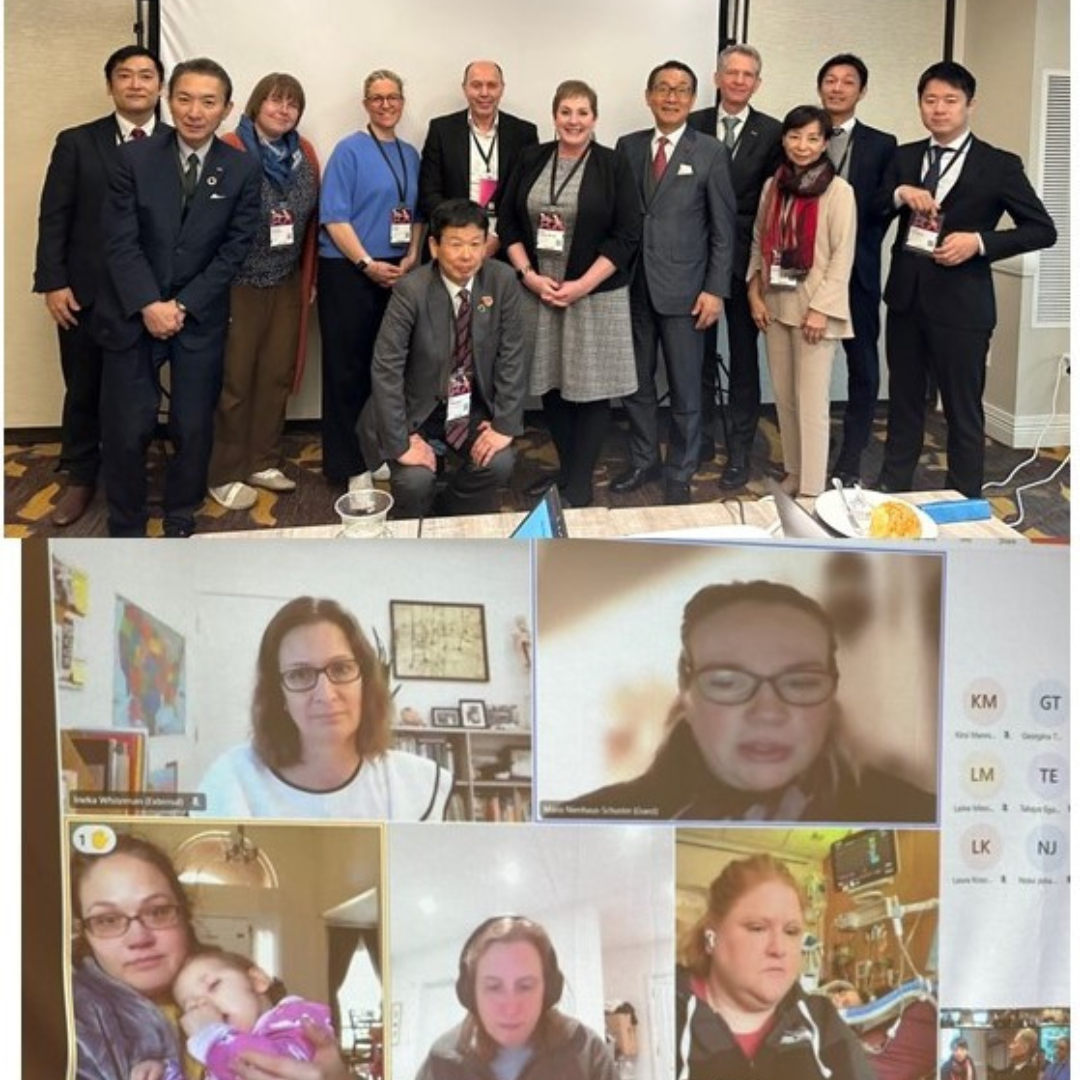
Leaders from JCR Pharmaceuticals and MEDIPAL along with CLN1 families and patient advocates attended the San Diego meeting in person and online in February.
During the WORLDSymposium in February, JCR Pharmaceuticals held a small, in-person meeting with patient advocate groups and families affected by CLN1 disease. BDSRA President Amy Fenton Parker attended in person, while I joined the group online.
During the meeting, an update was shared relating to JCR’s investigational Enzyme Replacement Therapy candidate ‘ATG-194’, an intravenously administered enzyme that is shown to cross the blood-brain barrier. ATG-194 has been previously studied in an ‘n of 1’ investigator-led study in a child with CLN1 disease under compassionate use in Germany (learn more here), with additional research and development ongoing.
The main purpose of the meeting was to bring experts together to discuss the initiation of a natural history study for CLN1 disease, and how we might all work together – families, patient groups, clinicians, and industry – to advance robust collection and documentation of clinical data from CLN1 patients around the world. This study will lay an important foundation for the future development of therapies for the treatment of CLN1 disease. We look forward to sharing further updates on this program in the future.
*Please also see our note to families below regarding Natural History Studies for CLN1 disease.
Collaboration Pharmaceuticals – CLN1 Enzyme Replacement Therapy Program Update
In February, Collaboration Pharmaceuticals hosted a virtual meeting with patient advocate groups and CLN1 families from around the world. The purpose of the meeting was to share program updates relating to their lead pipeline product – a recombinant human enzyme replacement therapy delivered directly to the brain (intracerebroventricular or ICV) for the treatment of CLN1. Currently, in preclinical development, the efficacy of this ERT has been described in mouse and sheep studies conducted by Prof. Jonathan Cooper and colleagues. Collaboration Pharmaceuticals is currently manufacturing the protein in preparation for IND-enabling toxicity testing.
Discussion is also focused largely on natural history studies for CLN1 disease to advance robust collection and documentation of clinical data from CLN1 patients around the world. We look forward to sharing further updates on this program in the future.
*Please also see our note to families below regarding Natural History Studies for CLN1 disease.
Therapeutic development for CLN1 disease: the importance of natural history studies
Natural history studies gather information on how a disease affects a person over a lifetime. Natural history data gathered robustly and systematically can help inform our understanding of the disease, improve quality of care, and is essential for the design and execution of clinical trials of potential new therapies, particularly in rare diseases like all forms of Batten disease.
With the ongoing development of multiple programs for the treatment of CLN1 disease as described above, BDSRA and other patient advocacy groups are well-placed to work together with families, clinicians, researchers, and industry to help facilitate and drive natural history studies for CLN1 disease. To enable us to support the advancement of all of these programs, we encourage all families who are affected by CLN1 disease around the world (both currently caring or bereaved) to reach out to BDSRA and complete the Family Register form.
This Register is not limited to CLN1 families only. Research studies are ongoing across at least seven forms of Batten disease. To stay informed of developments and research opportunities, we encourage families of all CLN types to complete this form if you have not already.
CLN2 DISEASE
REGENXBIO – CLN2 gene therapy program preliminary data presented at WORLD
As REGENXBIO continues to actively explore partnership opportunities to enable the ongoing development of its CLN2 gene therapy programs (see previous announcements on this here), it was encouraging to see preliminary data from the RGX-381 (ocular) and RGX-181 (CNS) gene therapy programs presented at the WORLDSymposium in San Diego in February. The presentations were:
RGX-381: Interim results from the first-in-human clinical trial of an investigational gene therapy for the treatment of ocular manifestations of CLN2 Batten disease
Presented by Dr. Christina Ohnsman, REGENXBIO
Interim results from the first-in-human intracisternal dosing of RGX-181 investigational AAV9 gene therapy in a child with late infantile neuronal ceroid lipofuscinosis type 2 (CLN2)
Presented by Dr. Carolina Fischinger Moura de Souza, Hospital de Clínicas de Porto Alegre, Brazil
BDSRA is pleased to share that REGENXBIO has agreed to join us on a WORLDSymposium highlights webinar in the coming weeks, where they will present these preliminary results and participate in a live Q&A.
Further details on this event will be posted soon, so keep an eye out on your inbox and our social media pages.
CLN3 DISEASE
Beyond Batten Disease Foundation/Theranexus – Batten-1 Program for CLN3 Disease
Phase 3 trial of Batten-1 for treatment of CLN3 disease
You may have seen the recent Theranexus press release. Theranexus has run into some unanticipated delays. Options are currently being considered and BBDF will schedule a family research call to follow up as soon as we have more definitive information and timelines to share with you.
If you would like to be included on BBDF’s email list for important updates and information, please email info@beyondbatten.org.
CONFERENCE NEWS
NCL2025 International Congress
Held every two years, the International Congress on Neuronal Ceroid Lipofuscinosis (NCL Congress) is the premier conference for NCL basic, translational, and clinical research. This meeting is primarily geared toward researchers, clinicians, industry partners, and patient groups. However, international families are also warmly invited to attend.
NCL2025 will be held in Australia in late 2025, with details to be announced in the coming months. To assist with planning, the local Congress Organising Committee invites all potential attendees (researchers, clinicians, industry partners, patient groups, and families) to fill in this expression of interest survey at your earliest convenience.
We hope to see you Down Under!
FAMILY REGISTER
Have you joined the Register yet?
In recent months, we’ve had a wonderful response to our calls for families to join our Register. Let’s keep it going!
The BDSRA Foundation Family Register is a vital tool that enables us to keep you informed of ongoing Batten disease research, including future clinical research and natural history opportunities.
The Register also enables BDSRA to better understand the prevalence of Batten disease, including the different subtypes and geographical locations around the world. This helps us tailor our education and support activities according to the needs of our families.
The Register is open to all current and bereaved families in the U.S. and internationally.
The information collected in this form is kept STRICTLY CONFIDENTIAL. Your involvement in this survey is entirely voluntary, and you may request to be removed from the list at any time. The form takes just a few minutes to complete and can be accessed by clicking here.
Thank you for participating in this important initiative!
RESEARCH OPPORTUNITIES – New Research Studies!
CLN2 Batten Disease Caregiver Study
Understanding the patient journey, treatment approaches, and potential therapeutic opportunities for CLN2 disease
BDSRA is leading this new survey-based study and invites all parents and caregivers (current or bereaved) of a child/children affected by CLN2 disease to participate.
Your insights and experiences as a caregiver for an affected child/children are invaluable in helping us to understand and ultimately help improve the standards of care and treatment options for patients. The goal of this survey is to gain insight into the Batten disease community’s experience with current treatment options, the overall understanding of gene therapy, and the hopes and concerns of current and bereaved caregivers when thinking about gene therapy as a possible treatment for CLN2 disease. The responses provided will assist BDSRA and potential industry partners in better understanding your family’s CLN2 disease journey and help guide future therapeutic research strategies.
The survey is open to U.S. and international families. No personally identifiable information will be collected in this survey.
For further information and to complete the survey, please click here. For any questions, please reach out to Dr. Ineka Whiteman at research@bdsraaustralia.org.
The final day to complete the survey will be March 29, 2024.
Thank you in advance for your time and participation in this survey.
Characterizing Sleep in Batten Disease
Principal Investigator: Heather Adams, Ph.D.
Research sponsor: Batten Disease Support, Research & Advocacy Foundation
The University of Rochester Batten Center is conducting a study of sleep function in individuals with CLN2 and CLN3 Batten disease.
What is involved?
Affected individuals will provide saliva samples to test melatonin concentration, and wear an actigraph (a wrist-watch style activity monitor). Parents/caregivers will assist the affected individual with study activities and will complete questionnaires.
Who may be eligible?
Affected individuals who…
- have a confirmed genetic or enzyme-based diagnosis of CLN2 or CLN3 disease
- have any symptoms of CLN2 or CLN3 disease
- are at least 2 years old
- live at home with at least one primary caregiver
- have not taken oral melatonin in the past 2 weeks (before study participation begins), or have only taken it occasionally (no more than 3 times per week)
No travel is required! All study activities will take place at your own home. This study is open to families currently residing in the USA.
The affected child & parent will receive $200 (total for household) for participation in the research.
If you are interested in learning more about the study, please contact the study team at: Batten@URMC.Rochester.edu or call Study Coordinator, Marianna Pereira-Freitas at: (585) 274-0205.

